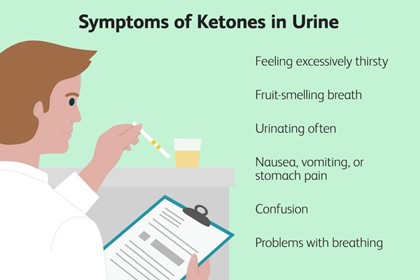A nurse in a pediatric clinic is reviewing the urine laboratory results for an adolescent.
For which of the following results should the nurse notify the provider?
Specific gravity 1.020
Uric acid 475 mg/24 hr
Ketones positive
Nitrites negative
The Correct Answer is C
c. Ketones positive.
Explanation:
Ketones in the urine can be an indication of diabetic ketoacidosis (DKA) or other metabolic disorders. It is abnormal and should be reported to the healthcare provider for further evaluation and management. Positive ketones suggest that the body is breaking down fats for energy instead of using glucose, which can be a sign of inadequate insulin levels or utilization.
Options a, b, and d are within normal ranges or do not indicate an immediate concern. A specific gravity of 1.020 is within the normal range and indicates appropriate urine concentration. Uric acid levels of 475 mg/24 hr are not mentioned as abnormal or concerning in the context provided. Nitrites negative indicates the absence of nitrites in the urine, which is a normal finding and indicates the absence of a urinary tract infection.
However, it's important to note that clinical judgment should always be exercised, and the nurse should consider the patient's overall clinical presentation and history when interpreting laboratory results and making decisions regarding reporting to the provider.

Nursing Test Bank
Naxlex Comprehensive Predictor Exams
Related Questions
Correct Answer is D
Explanation
The nurse should expect to find hyperkalemia in the medical record of a client who has sustained a full- thickness burn and is in the emergent phase of the burn. This is due to the release of potassium from damaged cells into the bloodstream.
a) Hypernatremia is not a common finding in the emergent phase of a burn.
b) Hypercalcemia is not a common finding in the emergent phase of a burn.
c) Hypermagnesemia is not a common finding in the emergent phase of a burn.
Correct Answer is A
Explanation
Delegating tasks involves assigning appropriate responsibilities to assistive personnel based on their level of training, competency, and scope of practice. Performing indwelling urinary catheter care is a task that can be safely delegated to an AP who has received proper training and demonstrated competency in this skill. The nurse should ensure that the AP is familiar with the facility's policies and procedures regarding catheter care and can perform the task safely and effectively.
Demonstrating how to use an incentive spirometer requires specialized knowledge and the ability to provide clear instructions. It is typically within the scope of practice of licensed healthcare professionals, such as nurses or respiratory therapists, who have the necessary expertise to properly educate and guide patients in using an incentive spirometer. This task should not be delegated to an AP.
Measuring and assessing the depth of a pressure injury requires clinical judgment and accurate evaluation, which falls within the scope of practice of a licensed nurse. It involves understanding wound assessment, proper technique for measuring depth, and interpreting the findings. This task should be performed by the nurse rather than an AP.
Changing the appliance on a new colostomy involves skills such as assessing the stoma, selecting the appropriate appliance, and ensuring proper application. This task requires specialized knowledge and training in stoma care, and it should be performed by a licensed nurse who has the expertise in managing ostomies. It should not be delegated to an AP.
Whether you are a student looking to ace your exams or a practicing nurse seeking to enhance your expertise , our nursing education contents will empower you with the confidence and competence to make a difference in the lives of patients and become a respected leader in the healthcare field.
Visit Naxlex, invest in your future and unlock endless possibilities with our unparalleled nursing education contents today
Report Wrong Answer on the Current Question
Do you disagree with the answer? If yes, what is your expected answer? Explain.
Kindly be descriptive with the issue you are facing.
